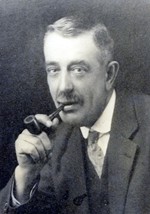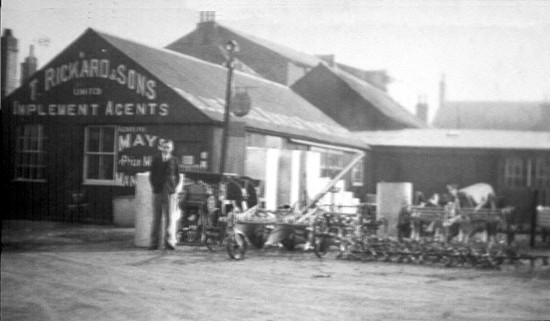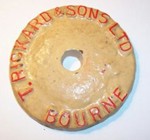Memories of Tom Rickard after his death were of a successful businessman who lived a life of Christian charity and earned a reputation for his innate goodness. His sudden death, at the age of 65, was mourned by the entire town and the Wesleyan [Methodist] Church in Bourne was packed to the doors for his funeral. Thomas Rickard was born at Calstock, Cornwall, in 1865 and moved to Bourne as a young man in 1891 to work as an ironmonger’s assistant in the shop premises at No 30 North Street owned by Messrs Foley Brothers who had just taken over the business from the late Arnold Pick. He showed enthusiasm, flair and ambition and was transferred from the shop to the rapidly developing agricultural machinery department then being developed in Meadowgate and for twenty years worked there as personal travelling representative and salesman for the owner, Ernest Foley. In 1918, although middle-aged, he decided to branch out on his own and built business premises alongside the cattle market site and soon afterwards opened a branch at Boston with his son, Howard, as manager. Three years later, the business became a limited liability company and following the death of Ernest Foley, he acquired the business where he began his career, the legal transaction being completed in 1930, just a few months before his death. Despite being one of the most successful businessmen in Bourne, Mr Rickard also devoted a great deal of his time to religious, public and social work. He was an active member of the Wesleyan Church where he held many lay appointments including that of steward and a Sunday School teacher and for a long period, choirmaster, an appointment that reflected his appreciation for music which was also shared by members of his family, notably his daughter, Mrs Oliver Wall, an accomplished pianist and organist. His participation in public life began with election to Bourne Urban District Council in 1924 and he subsequently earned the esteem of his colleagues to win their support for the chairmanship from 1929-30. His interests lay in many fields but his work in improving the refuse collection service was particularly valuable and he was also chairman of the Fire Brigade Committee which authorised the purchase of the latest available equipment. Social work saw the beginning of regular rag days which succeeded in raising funds for the Butterfield Hospital while his involvement with the business and commercial life of the town also brought about the revival of the Tradesmen’s Association that had foundered some years before. He died suddenly at Calstock House, his home in North Road (named after his birthplace in Cornwall) on Monday 19th January 1931, aged 65. He had been unwell for some months but apart from brief interludes, had been able to attend to his business affairs and in the final few days he had been confined to the house although his condition was not regarded as serious. During the evening, he called to his wife and daughter who was visiting for help and they assisted him to a chair until the arrival of Dr John Galletly who diagnosed that he had suffered a seizure and he died shortly afterwards. The funeral was held the following Friday at the Wesleyan Church, the coffin being carried by members of the Bourne Fire Brigade and the fire engine following bearing the wreaths, the cortege being met at the church door by the minister, the Rev H A Riggall. The church was filled with mourners from all walks of life with many deputations from those organisations with which he had been associated including BUDC led by the chairman, Councillor Mrs Caroline Galletly. Mr Riggall, who gave the eulogy, paid tribute to a man who had been held in such high esteem in the town. “It frequently happens that good men go along the corridors of ill health and weakness before they reach the gates of the eternal city”, he said. “But the deceased was spared a lingering illness and the door was opened for him very quickly. For those who have been so suddenly bereaved we extend out sympathy.” Canon John Grinter, the Vicar of Bourne, was unable to attend the funeral but said afterwards: “No one knows all the many acts of kindness that he has rendered. His religious life better fitted him for the public duties that he had undertaken, duties which few were willing to assume and which were becoming more arduous but he will always be remembered for the work he did for the choir and the Sunday School at the Wesleyan Church.” Mr Rickard left a widow and two daughters, Mrs Oliver Wall and Miss Muriel Rickard, and four sons, all associated with the business, T Howard Rickard (Boston), C Eric Rickard, Jack A Rickard and Cyril Rickard. He is buried in the town cemetery.
See also Farming in past times Edward Foley
Go to: Main Index Villages Index
|
||||||||


